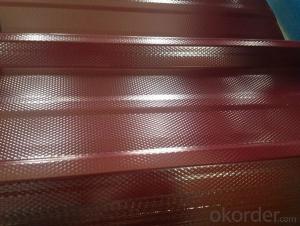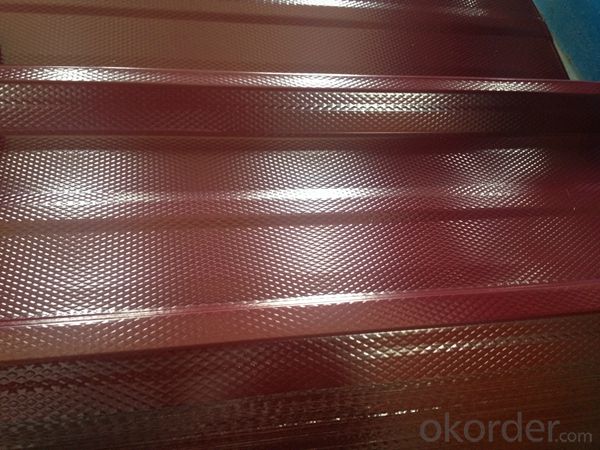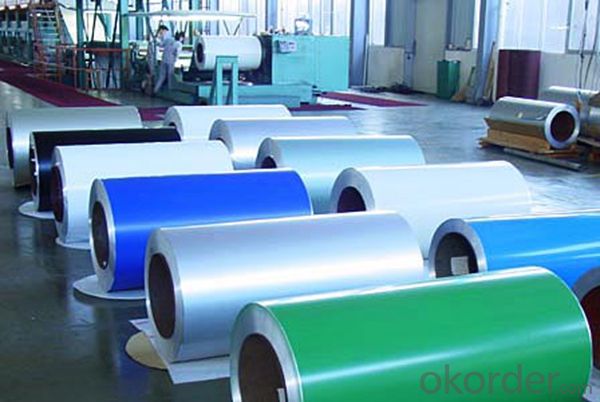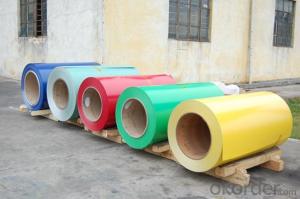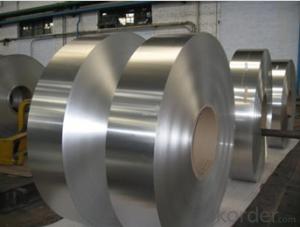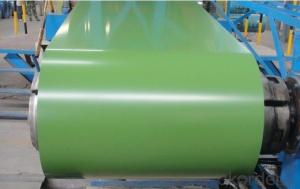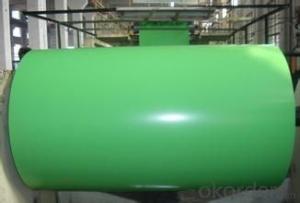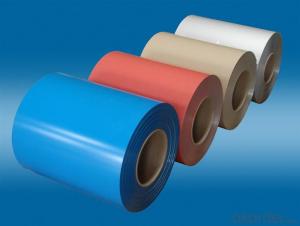Wholesale Coated Aluminum Coil - Color Coated Aluminum Alloy Coils Made in China
- Loading Port:
- Shanghai
- Payment Terms:
- TT OR LC
- Min Order Qty:
- 5 m.t.
- Supply Capability:
- 10000 m.t./month
OKorder Service Pledge
OKorder Financial Service
You Might Also Like
Specification
1. Specification of Color coated Aluminum Alloy Coils Made in China
Alloy: 1050, 1060, 1100, 3003, 3004, 3005, 3105, 5005, 5052, 5083, 5754
2) Temper: Various status
3) Thickness: 0.3-150mm
4) Width: 300-1950mm
5) Length: Under9500mm/ Coil
6) Weight: 2.5-5.0 tons per coil
7) Dimensions and weight can be produced according to clients' specifications.
8) Inner Diameter: 505mm, 605mm
9) Packing: Export standard, wooden pallet.
10) Delivery time: 20 days
11) Minimum order quantity: 5 tons per size.
12) The term of payment: T/T, irrevocable L/C at sight.
13) Surface: Bright
14)Origin: China
2. Application of Color coated Aluminum Alloy Coils Made in China
(1).Interior: wall cladding, ceilings, bathrooms, kitchens and balconies, shutters, doors...
(2).Exterior: wall cladding, facades, roofing, canopies, tunnels,column covers , renovations...
(3).Advertisement: display platforms, signboards, fascia, shop fronts...
3. Feature of Color coated Aluminum Alloy Coils Made in China
*Such coil is specially designed to replace aluminum ingot, due to the high export tax of aluminum ingot, the coil has better price than ingot.
*This type of coil can fit customer's remelting furnace just like ingot, no need to make any change to the production line that was previously used for ingot. The standard coil size and weight is very suitable for the feed gate of furnace.
*This type of coil causes less material wastage than ingot when remelted.
*Our coil is made directly from ore, no need to go though the ingot making process, quality is much better than other suppliers who use ingot scrap to make coil.
Be free from Oil Stain, Dent, Inclusion, Scratches, Stain, Oxide Dicoloration, Breaks, Corrosion, Roll Marks, Dirt Streaks and other defect which will interfere with use
4. Certificate:
SGS and ROHS(if client request, paid by client), MTC(plant provided), Certificate of Origin(FORM A, FORM E, CO), Bureau Veritas and SGS (if client request, paid by client), CIQS certificate
5. Image of Color coated Aluminum Alloy Coils Made in China
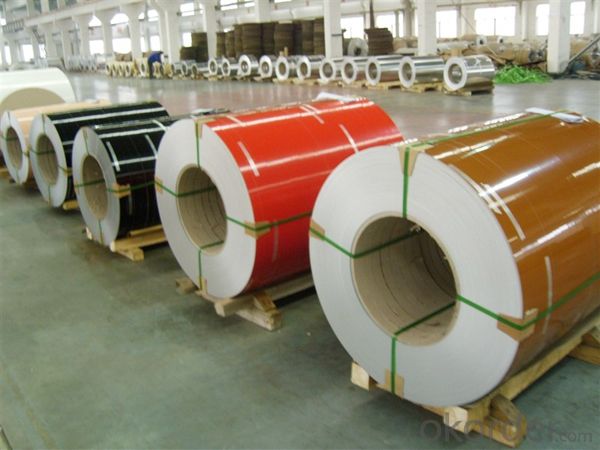
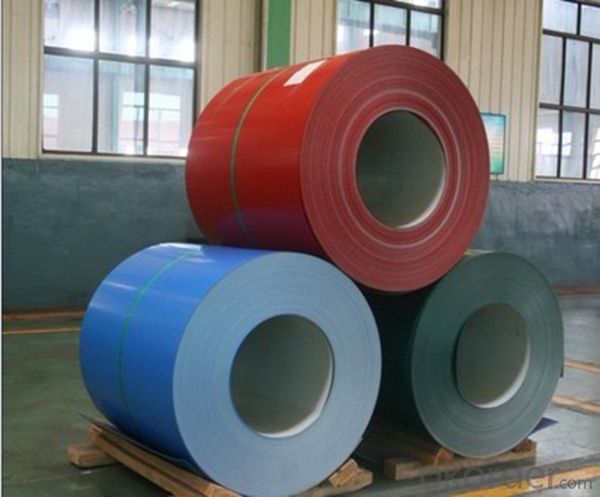
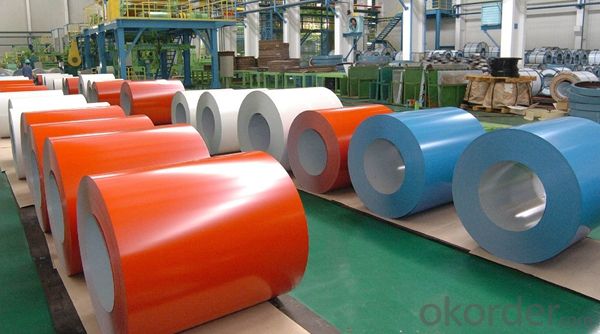
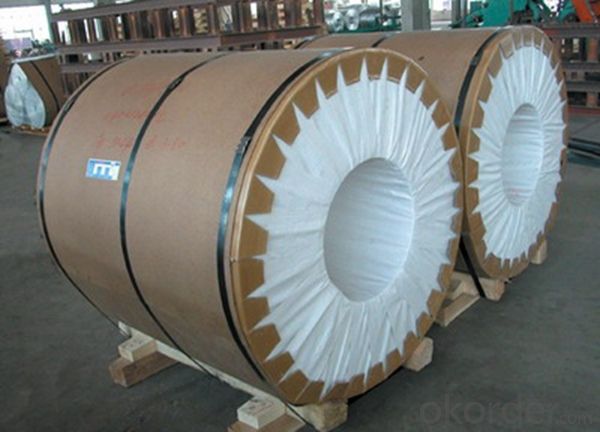
6. Package and shipping of Color coated Aluminum Alloy Coils Made in China
eye to wall
eye to the wall
with wood pallet (wooded case also available)
7. FAQ
1) What is the delivery time?
Dpends on actual order, around 20 to 35 days
2)What is the QC system:
We have QC staff of 20 persons and advanced equipment, each production is with MTC traced from Aluminum ingot lot.
3) What market do you mainly sell to?
Australia, America, Asia, Middle East, Western Europe, Africa etc
- Q: Are aluminum coils suitable for lightweight panel applications?
- Indeed, lightweight panel applications can benefit from the use of aluminum coils. Renowned for their lightweight and corrosion-resistant properties, aluminum coils prove to be an exceptional option for these applications. With ease, aluminum coils can be molded and fashioned into panels of various sizes and thicknesses, showcasing their remarkable versatility. Moreover, the high strength-to-weight ratio exhibited by aluminum facilitates the production of robust and enduring lightweight panels. These panels find utility across a range of industries, including automotive, aerospace, construction, and transportation, where the reduction of weight is paramount. All in all, the lightweight nature, corrosion resistance, versatility, and strength of aluminum coils render them a fitting choice for lightweight panel applications.
- Q: What influence do aluminum coils have on the welding process?
- <p>Aluminum coils can significantly affect welding work due to their unique properties. Aluminum has a high thermal conductivity, which requires more heat input to achieve the necessary temperature for welding. It also has a high oxide layer that can interfere with the welding process, leading to porosity and poor joint strength if not properly managed. Additionally, aluminum's low melting point can cause challenges in maintaining the correct temperature during welding. Specialized techniques, such as TIG (Tungsten Inert Gas) welding, and the use of appropriate filler materials are often necessary to ensure a successful weld. Proper cleaning and preparation of the aluminum surface are also crucial to prevent contamination and ensure a strong, defect-free weld.</p>
- Q: Can aluminum coils be used in automotive heat exchangers?
- Yes, aluminum coils can be used in automotive heat exchangers. Aluminum is a popular choice for heat exchangers in the automotive industry due to its excellent thermal conductivity, lightweight nature, and resistance to corrosion. These properties allow aluminum coils to efficiently transfer heat from one fluid or gas to another, making them ideal for use in automotive heat exchangers. Additionally, aluminum coils are also easy to manufacture and can be formed into various shapes and sizes, further enhancing their suitability for automotive applications.
- Q: i've been looking all over the internet for this information and i cant fin it! please help!what is aluminum's isotopic notation?what is aluminum's density at room temperature with units?what is aluminum's most common oxidation # ?aluminums e-dot diagram? symbol with valence electronschemical equation?enviornmental concers?
- isotopic okorder type environmental hazards of aluminum in the search bar and press search
- Q: I have a electrical project to do, and could save about $300.00 by using aluminum wire since I can get it free, but I have never used aluminum before, and am not sure if it is a good way to go.
- I would not recommend it. Aluminum wire expands and contracts a great deal causing the connections to become loose, or break. That is what I was taught.
- Q: Are aluminum coils suitable for high-temperature roofing applications?
- High-temperature roofing applications are not suitable for aluminum coils. Despite being durable and resistant to corrosion, aluminum has a lower melting point compared to commonly used roofing metals like steel or copper. With a melting point of approximately 660 degrees Celsius (1220 degrees Fahrenheit), aluminum cannot withstand the high temperatures experienced on hot roofs during summer or in areas with high ambient temperatures. Consequently, employing aluminum coils for high-temperature roofing applications may cause the material to warp, distort, or even melt due to the excessive heat, resulting in structural damage and potential leaks. It is recommended to opt for materials with higher melting points, such as steel or copper, for roofing projects where high temperatures are a concern.
- Q: im melting aluminum and what should i use for metal. cans will just oxygenize( i forget the word for it sorry)
- aluminum, in general, will just oxidize if heated in air. it is not just cans that behave that way when they (alcan, alcoa) smelt aluminum industrially they keep it in a reducing environment and do not allow molten aluminum to contact air. so use any aluminum you like but prevent it from contacting air.
- Q: Are there any safety considerations when handling aluminum coils?
- Yes, there are several safety considerations when handling aluminum coils. Firstly, aluminum coils can be heavy and unwieldy, so it is important to use proper lifting techniques or mechanical lifting equipment to avoid strain or injury. Secondly, aluminum coils can have sharp edges or corners, so it is important to wear protective gloves and use caution when handling them to avoid cuts or punctures. Additionally, aluminum can conduct electricity, so it is important to ensure that coils are properly grounded to prevent electrical shock. Furthermore, aluminum coils can be very slippery when wet or oily, so it is important to maintain a clean and dry working area to prevent slips, trips, and falls. Lastly, aluminum can react with certain chemicals, so it is important to handle and store coils away from incompatible substances to prevent any chemical reactions or hazardous situations. Overall, by following proper handling procedures, wearing appropriate personal protective equipment, and being aware of potential hazards, the risk of accidents and injuries when handling aluminum coils can be greatly reduced.
- Q: How do aluminum coils contribute to the reduction of carbon footprint?
- There are several ways in which aluminum coils can contribute to reducing the carbon footprint. Firstly, due to its lightweight nature, aluminum requires less energy for transportation compared to heavier materials like steel. This leads to lower fuel consumption and emissions during transportation, ultimately reducing the overall carbon footprint. Furthermore, aluminum is highly recyclable and can be recycled indefinitely without any loss in quality. Recycling aluminum requires significantly less energy (up to 95% less) compared to producing new aluminum from raw materials. By utilizing aluminum coils, which can be easily recycled, we can decrease the demand for new aluminum production. Consequently, this reduces the carbon emissions associated with extracting and refining raw materials. In addition, aluminum coils possess excellent thermal conductivity properties. This makes them highly efficient for various heating and cooling systems, including air conditioning units and heat exchangers. By incorporating aluminum coils into these applications, energy consumption is minimized as they facilitate the transfer of heat more efficiently. This results in lower energy consumption and reduced carbon emissions. Lastly, aluminum coils have a longer lifespan compared to materials such as copper or steel. As a result, they require less frequent replacement, leading to reduced waste generation and lower carbon emissions associated with manufacturing and disposing of new coils. Overall, by opting for aluminum coils instead of other materials, we can make significant progress in reducing carbon emissions and promoting a more sustainable future. The utilization of aluminum coils offers benefits through their lightweight nature, recyclability, thermal conductivity properties, and longer lifespan in contributing to the reduction of the carbon footprint.
- Q: When they say to coat entire roof system with Aluminum coating, what does that mean? The area to coat is NOT the ceramic barrel tiles of a roof but the flat section covered with tar paper and granules of shiny sand. Is it a liquid? Clear? Good for the roof.? How is it applied?
- Why you would be coating a flat roof with Aluminum coating is beyond anything I have learned. Flat roofs should have a felt and tar coating to water proof them. Aluminum roof coating is used mostly on mobile homes to reflect heat because mobile homes don't have attics to trap the heat and carry it to vents. It also seals the water out at the metal seams. Aluminum coating is a type of polymer that has aluminum flakes in it. It is brushed on like a thick coat of paint and allowed to dry.
Send your message to us
Wholesale Coated Aluminum Coil - Color Coated Aluminum Alloy Coils Made in China
- Loading Port:
- Shanghai
- Payment Terms:
- TT OR LC
- Min Order Qty:
- 5 m.t.
- Supply Capability:
- 10000 m.t./month
OKorder Service Pledge
OKorder Financial Service
Similar products
Hot products
Hot Searches
Related keywords
